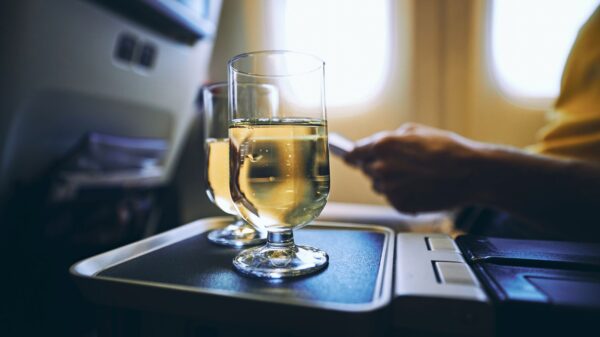
Boozing on Board: How Many Flyers Have Been Drunk on a Flight?

According to the results of a new study, just over one in 10 Brits have been drunk while travelling on a flight – an act which is classed as a legal offence. Under the Air Navigation Order, it’s against the law for anyone to be intoxicated while on an aircraft, meaning many flyers break the law while travelling.
The findings come from a new survey by Go.Compare. Travellers were asked about their drinking habits when flying and their opinions on alcohol consumption on planes. Based on the results, many travellers have broken the law while jetting off on holiday.
Passengers who get drunk during a flight can face a maximum punishment of two years in prison and a £5,000 fine. Attempting to board a flight when drunk can also result in penalties.
Yet, 40% of travellers in the survey said they were not aware that it was against the law, including over two-thirds (68%) of those who have been drunk on a plane. This means that most flyers who break this law do so without realising, but also that around a third (32%) of those who get drunk on a flight do so despite knowing that it’s illegal.
Younger travellers and women have the least awareness of the law. Just under half (48%) of under 35s said they knew it was illegal, compared to three-quarters of those aged 55 or above. Around two-thirds (65%) of men are aware of the law, compared to just over half (56%) of women. This suggests that women and younger flyers could be more at risk of breaking this law unknowingly.
Flight passengers raise several safety risks when travelling under the influence. Drunk flyers are more likely to act out and become aggressive, and are less able to follow safety procedures, posing a serious risk in an emergency scenario. These behaviours can result in a flight being diverted and the offending travellers being kicked off.
Around 29% believe alcohol should be banned in airports, with over a third (34%) saying a ban should apply to airlines. But, most travellers are against the introduction of alcohol restrictions for air travel, with over half (57%) saying neither should be introduced.
Those who have been drunk on planes before were particularly against the suggested restrictions, with only a fifth (19%) saying there should be a ban for either airports or airlines. In contrast, those aware of the law against drinking on a plane were most in favour of tighter regulations, with just under half (45%) saying they should be introduced.
Rhys Jones, travel expert at Go.Compare, said: “There’s no harm in having a drink in the departure lounge to kick off your holiday, but you have to be careful that things don’t get out of hand. As well as posing huge safety risks, being drunk on a plane could land you with a hefty fine and even jail time.
“It’s also worth remembering that travel insurance offers no protection for alcohol-related issues. If you’re asked to leave a flight or denied boarding due to being too drunk, you’ll likely lose your holiday and will still have to pay for it yourself, so it can be a very costly error in more ways than one.
“There’s no specific limit on how much you can drink on a plane, it’s just illegal to become intoxicated. There’s a lot of room for interpretation, so it’s best to stay on the safe side and make sure you remain sober. Remember that the low air pressure and dry air on a plane can make you feel more drunk and dehydrated, so if you do fancy an alcoholic drink, consider getting a glass of water to go with it.”
More information about travellers being drunk on a plane can be found on Go.Compare’s website.













































